Iran Tests Satellite-Carrying Rocket - State TV
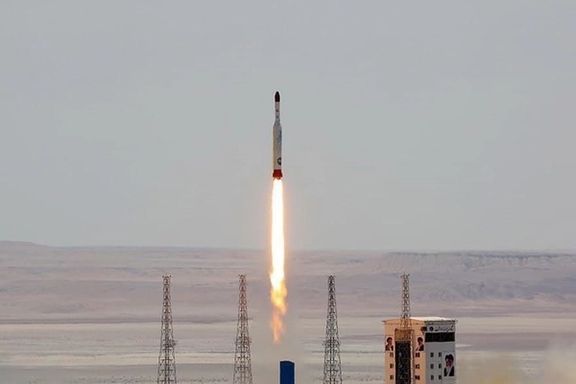
Iran's Revolutionary Guards tested a new satellite-carrying rocket on Saturday, state media reported, a development likely to anger the United States.

Iran's Revolutionary Guards tested a new satellite-carrying rocket on Saturday, state media reported, a development likely to anger the United States.
Washington fears the same long-range ballistic technology used to put satellites into orbit could also be used to launch nuclear warheads. Tehran has regularly denied having any such intention.
"The flight test of this satellite carrier with a solid-fueled engine ... was successfully completed," state news agency IRNA reported.
The Ghaem 100, Iran's first three-stage launch vehicle, will be able to place satellites weighing 80 kg (176 lb) in an orbit of 500 km (310 miles) from the earth's surface, IRNA said.
Amirali Hajizadeh, head of the Revolutionary Guards' aerospace division which developed the Ghaem 100, said the rocket would be used to launch Iran's Nahid satellite for the telecommunications ministry, state media reported.
Saturday's operation tested the first sub-orbital stage of the rocket, the reports added.
Iran, which has one of the biggest missile programs in the Middle East, has had several failed satellite launches in the past few years, blamed on technical issues.
A UN resolution in 2015 called on Iran to refrain for up to eight years from work on ballistic missiles designed to deliver nuclear weapons following an agreement with six world powers.
Iran says it has never pursued the development of nuclear weapons and, therefore, the resolution does not apply to its ballistic missiles, which Tehran had described as an important deterrent and retaliatory force.
Reuters Report
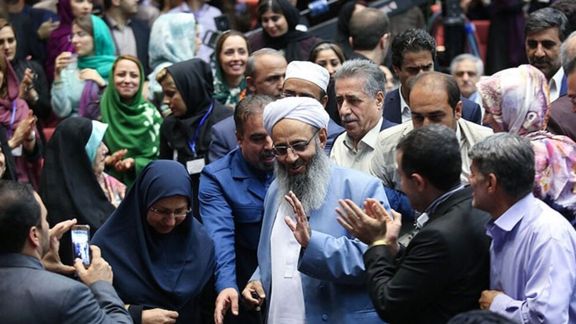
The Islamic Republic has upped the ante against the Sunni cleric of Zahedan for his harsh criticism of the brutal and non-democratic approach of the government to protests.
Tasnim News Agency, affiliated to the Islamic Revolutionary Guard Corps (IRGC), called Molavi Abdolhamid the source of insecurity in Sistan and Baluchestan, telling him to ask his “dictator Saudi friends to hold a referendum.”
Molavi Abdolhamid, who called for a plebiscite in Iran during his Friday prayer sermon November 4, wrote in a statement the same day, “Unfortunately, another crime was committed in Baluchestan and this time an unfortunate incident took place in the city of Khash in which protesters were killed in cold blood.”
His statement confirmed the “martyrdom of at least 16 people” and dozens of more injuries while teenagers and young people were chanting slogans and throwing stones at governor’s office in Khash, but they were “directly targeted by live rounds.”
He further called the “bloody tragedy in Khash” as well as the “Bloody Friday in Zahedan [September 30]” as the epitome of “the extent of oppression and discrimination” that he had warned against many times in the past.
The Sunni cleric asked the seminaries of Qom and the authorities to listen to the voice of the people and to “acquiesce to nation’s request, which is the main criterion.”

The Islamic Republic has at last admitted it has provided drones to Russia claiming that they were sent to Russia months before the Ukrainian war.
Iran’s Foreign Minister Hossein Amir-Abdollahian said Saturday Tehran provided Moscow with a limited number of drones months before the war in Ukraine, but if it is proven that Russia has used them in the war against Ukraine, the Islamic Republic will not be indifferent to it.
Previously, he had said, "Iran has not provided any weapons to Russia for the war in Ukraine," implying that some arms were transferred, without referring to drones.
Amir-Abdollahian’s statement admitting supplying drones to Moscow came as Europe joined the United States on condemning Iran’s support for the Russian invasion of Ukraine.
The G7 foreign ministers meeting in Germany this week issued a statement demanding that Iran and Russia to be held accountable for “balatant violations” of UN Security Council Resolution 2231, which endorsed the 2015 Iran nuclear deal. The US, France, Germany, and the United Kingdom – G7 members along with Canada, Italy and Japan – have argued that any Iranian supply of military drones to Russia is a breach of the agreement, the JCPOA (Joint Comprehensive Plan of Action).
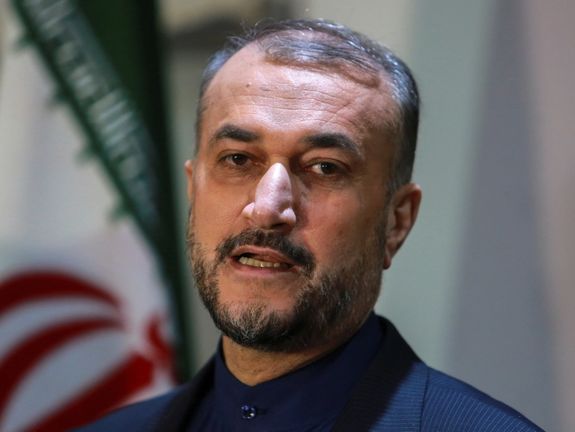
Iran’s supply of military hardware and reportedly technicians to help in their deployment to battle fields has further put in doubt further negotiations to restore the JCPOA. After 18 months of multilateral talks, the diplomatic effort reached an impasse in August, with the US saying that Iran was presenting demands outside the scope of the 2015 deal.
Washington has pledged more sanctions related to Tehran supplying weapons to Russia as fierce popular protests have rocked Iran since mid-September, further plunging its weakened economy into crisis.
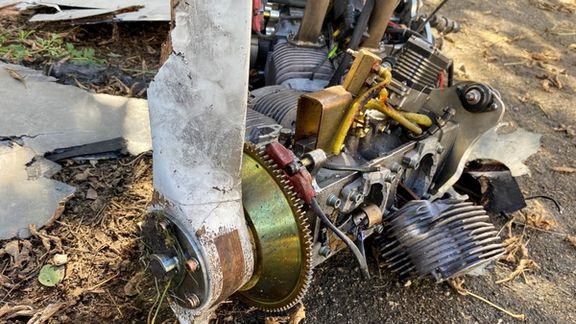
On the sidelines of a meeting in Tehran, Iran’s top diplomat also rejected supplying missiles to Russia saying, “we agreed with the foreign minister of Ukraine that if they have any documents on Russia’s use of Iranian drones in Ukraine, they should provide them to us.”
He further added that Iran’s position regarding the war in Ukraine “is to stop the war, return the parties to negotiations and return the refugees to their homeland.”
Ukraine has reported a spate of Russian attacks using Iranian-made Shahed-136 drones in recent weeks. Iran was so far denying supplying the drones to Russia, and this week, Iran’s Ambassador to the United Nations Amir Saeid Iravani rejected the accusations saying they are “totally baseless”.
Amir-Abdollahian’s comments come after the United States and its allies urged the UN to probe if Moscow has used Iran-made drones to attack Ukrainian infrastructure and civilian targets.
Ukraine’s Intelligence Directorate said Tuesday that the Islamic Republic is going to deploy over 200 combat drones to Russia in early November including Shahed-136, Arash-2 kamikaze drones, and Mohajer-6 reconnaissance and combat UAVs.
CNN also reported on Tuesday that Western officials believe Tehran was preparing to send nearly 1,000 additional weapons, including ballistic missiles and

Iran sits amid a crowded agenda at the G7 meeting in Munster, Germany, as the bloc grapples with multiple challenges centered on Ukraine.
After tensions during the Donald Trump presidency, the two-day gathering concluding Friday shows a tight relationship between the United States and Germany, currently chairing the G7 bloc that also includes Canada, France, Italy, Japan and the United Kingdom.
German foreign minister Annalena Baerbock, from Alliance 90/The Greens, has spoken out over protests in Iran since mid-September, and Thursday Berlin warned citizens in Iran to leave due to a “concrete risk of being arbitrarily arrested.” In another sign of deteriorating relations, Iran-Iraq war veterans gathered outside the German embassy in Tehran this week to highlight German firms helping Saddam Hussein with chemical weapons.
At a US-German Futures Forum Friday in Munster with Antony Blinken, Baerbock described the US Secretary of State, whom she has met ten times since taking office ten months ago, as a friend. Blinken praised as “extraordinary” the “the leadership of the German foreign minister.”
Blinken said that in setting “rules for how technology is used,” the US and Germany had to “make sure that the values we stand for…carry the day.” He noted that the “vast democratization of information technology” and highlighted recent US decisions to lift any threat of sanctions against those supplying internet-access technology to Iran.
Baerbock referred to opportunities for online education she had recently seen in Egypt, where the COP27 United Nations climate conference begins Sunday. The German foreign minister said the G7 meeting had linked information technology to “democracy and freedom,” which she said underlay Berlin’s approach to Iran.
Baerbock pledged to bring “atrocities” to UN bodies and said “democratic economic powers” needed a majority on UN human rights bodies. The US has called for Iran to be removed from the UN Commission on the Status of Women.
In recognition of recent blows to Germany and European Union expectations of trade bringing states together politically – which underlay both Russian energy supplies and the 2015 Iran nuclear agreement – Baerbock said “we have learned” this was not always true.
Tanks, jets, drones
The US and Germany, respectively the largest and second largest arms supplier to Kyiv, appear to be the same page over Ukraine. Wary of Russian escalation, both have resisted calls for advanced weapons, with Ukraine seeking Leopard 2 tanks and Marder armored infantry vehicles from Berlin, and F-16 jets from Washington.
The US and Germany, along with France and the UK, have raised the issue of Iranian-made drones at the UN Security Council, arguing that any supply contravenes the 2015 Iran nuclear agreement and justifies ‘snapback’ of UN sanctions on Tehran. Given vagaries over ‘snapback,’ and experts’ disagreements as to whether drones as relatively light weapons violate the 2015 agreement, the move may be intended to deter Iran from sending missiles.
In an interview with Dubai-based al-Arabiya published Friday, Rob Malley, the US Iran special envoy, said Iran was “embarrassed” as it had become “clear to the world” that it had “sided with Russia and its war of aggression against Ukraine.”
Domestic criticism
Further underlying US-Germany cooperation is shared experience of center-left governments facing domestic criticism. With US aid to Ukraine at $50 billion so far, House minority leader Kevin McCarthy last month ruled out a “blank check,” and some Republican candidates in November 8 Congressional elections are critical of such support for Ukraine when Americans face rising bills. In Germany opposition politicians have queried the €200 billion allocated to citizens and companies over energy price hikes due to the Ukraine war.
A further complication facing both the German-US relationship and the G7, is the rise of China. While the US has cautioned other countries over Beijing’s involvement in key sectors, German Chancellor Olaf Scholz, a Social Democrat, arrived in China Saturday seeking “economic ties as equals, with reciprocity.” Chinese-made parts in globally manufactured items may include some, alongside European and US components, in Iranian drones, the Institute for Science and International Security said in a recent report.
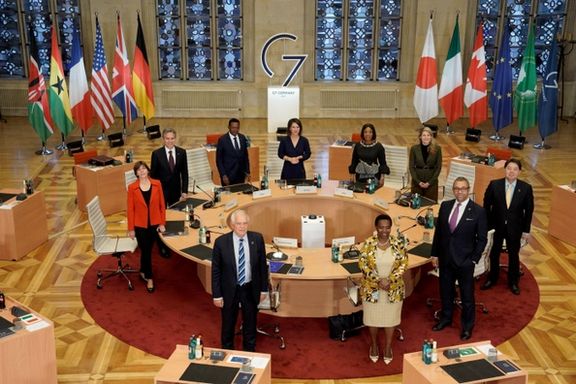
The G7 foreign ministers meeting in Germany concluded its busy two-day agenda Friday with a 3,500-word statement including a 500-word section on Iran.
Stressing the importance of universal human rights, the bloc called on Iran to honor international law, including the International Covenant on Civil and Political Rights, the General Assembly resolution adopted in 1966 and in force since 1976.
The wide-ranging G7 statement expressed support for efforts at the United Nations to hold both Iran and Russia accountable for “blatant violations” of UN Security Council Resolution 2231, which endorsed the 2015 Iran nuclear deal. The US, France, Germany, and the United Kingdom – G7 members along with Canada, Italy and Japan – have argued that any Iranian supply of military drones to Russia would breach the agreement, the JCPOA (Joint Comprehensive Plan of Action).
As the G7 statement held Iran responsible for not making the “necessary decisions” needed in international talks to restore the JCPOA, the American network CNN Friday cited “US intelligence officials” claiming Tehran had sought Russian help in acquiring “additional nuclear materials and with nuclear fuel fabrication” should JCPOA talks fail.
Russia has consistently expressed support for the JCPOA, and alongside China and three western European signatories criticized the US over its 2018 withdrawal, prompting Iran by 2019 to begin expanding the program. CNN gave no details of the assistance Iran had reportedly sought, nor why it needed Russian help given it is already enriching uranium to 60 percent and has stockpiled uranium well in excess of JCPOA limits.
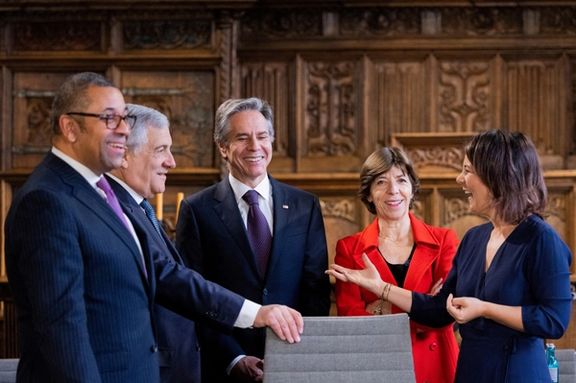
While not confirming the CNN story, National Security Council spokesperson Adrienne Watson told the network the US was “working with partners to expose the growing ties between Iran and Russia – and hold them accountable.” She said that while “the JCPOA is not on the agenda… we will be firm in countering any cooperation that would be counter to our non-proliferation goals.”
‘Unabated expansion’
While the G7 statement expressed concern at the “unabated expansion of Iran’s nuclear program, it made no specific reference to the JCPOA while calling on Iran to “fulfill its legal obligations and political commitments in the field of nuclear non-proliferation without further delay.”
The statement pledged to continue work between the G7 and “other international partners…to address Iran’s nuclear escalation and insufficient cooperation with the IAEA [International Atomic Energy Agency] regarding its [Nuclear] Non-Proliferation Treaty (NPT) safeguards agreement.” One of the issues holding up progress in JCPOA talks has reportedly been Iran’s demand that the IAEA drop a probe into unexplained uranium traces found in sites related to Iran’s nuclear work before 2003.
The G7 statement also condemned Iran “destabilizing activities in and around the Middle East,” including “transfers of…advanced weaponry to state and non-state actors,” apparently a reference to Iran’s links with Syria’s President Bashar al-Assad, Hezbollah in Lebanon, armed Palestinian groups, and Ansar Allah in Yemen.
The statement deplored “the Iranian government’s erosion of civil space, and independent journalism, its targeting of human rights defenders, including by shutting down the internet and social media.” It urged Iranian authorities to “treat women as equal, respecting the universal rights provided to them under the relevant international human rights treaties.” It called for the release in Iran of “unjustly detained prisoners, including recently arrested protesters, children, journalists and human rights defenders, and... accountability for perpetrators of human rights violations and abuses.”
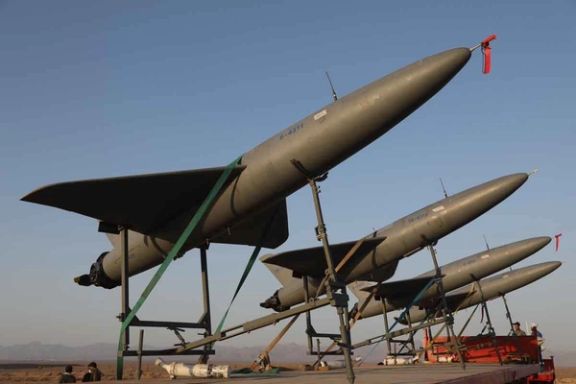
Ukraine is seeking logistic information regarding the Moscow-Tehran weapons trade, while Israel is softening its opposition to providing military aid to Kyiv.
The Ukrainian Defense Ministry issued a public notice on its website Wednesday requesting information on logistical routes used to facilitate weapons trade between Russia and the Islamic Republic, including delivery points, warehouses railway stations, military officers and other infrastructure.
“We remind you that all persons involved in the supply of Iranian weapons for use in the war against Ukraine violate international law and become complicit in crimes committed by the Russian Federation on the territory of Ukraine,” the ministry stated.
Meanwhile, Bloomberg reported on Friday that Israel is apparently changing it long-maintained policy of strategic neutrality regarding the Russian invasion of Ukraine after months of reluctance, implying that it may start selling weapons, including air defense systems, to Ukraine.
According to the report, a turning point came late last month, when Israeli Defense Minister Benny Gantz took a long-requested call from his Ukrainian counterpart Oleksii Reznikov, in which Israel committed to help Ukraine develop an early-warning system, similar to one that alerts Israelis to incoming fire from the Gaza Strip.
Israel has also begun to share its intelligence, Ukrainian President Volodymyr Zelenskiy said late in October, welcoming what he called a “positive” trend.
The cooperation, however, is harshly criticized by Russian officials, such as former President Dmitry Medvedev who warned Israel in October against sending weaponry to Ukraine, saying it would destroy all diplomatic relations between Jerusalem and Moscow.